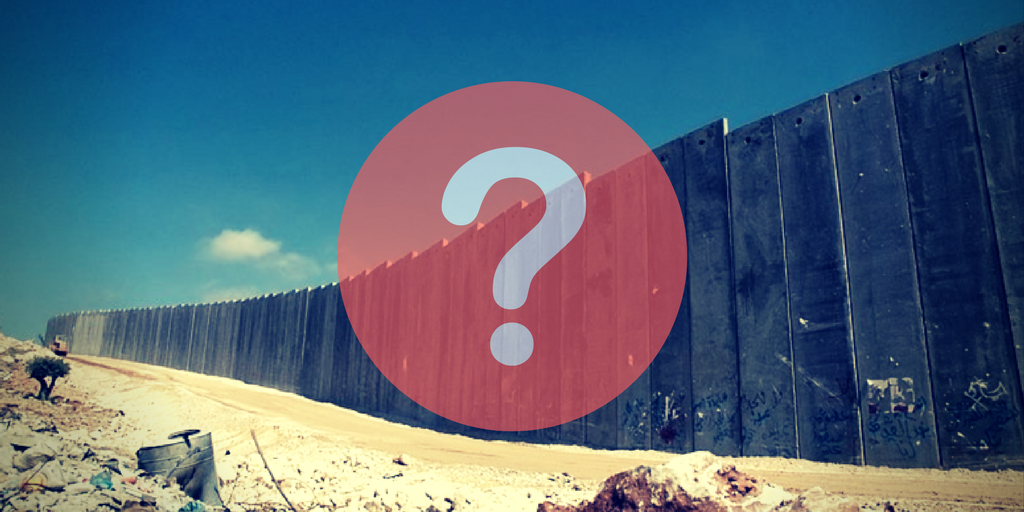“Conflict management has not countered successful Palestinian efforts…to change crucial strategic facts on the ground with deleterious long-term implications on Israel’s security”.
Israel’s present conflict management approach, which has succeeded in reducing Palestinian terrorism to manageable proportions, is an insufficient response to the dangers of Palestinian territorial expansionism…[M]anaging the conflict alone has also resulted in considerable costs not directly linked to acts of terrorism… Prof Hillel Frisch – of the newly established Jerusalem Institute for Strategic Studies, October 31, 2017
For many the notion of “managing the conflict” has long been a seductive illusion and one I have warned repeatedly against submitting to – see for example: here; here; here; here & here.
Conflict management as (allegedly) the “least worst option”
Thus, in “‘Conflict management’: The collapse of a concept” I wrote: For several years now I have been warning against clear and present dangers inherent in conflict management—cautioning that it is little more than ‘kicking the can down the road’ into a even more risk-fraught future. I expressed growing concern that by adopting a policy of avoiding confrontations, which Israel could win, the government may well back the nation into a confrontation so severe that it may not—or only do so at devastating cost.”
For several years, the staunchest support for the conflict management paradigm came from Bar Ilan Universty’s BESA Center for Strategic Studies. Indeed, just over a year ago, David Weinberg, the BESA director of public affairs published a synopsis of months of discussions that took place in the center’s seminar rooms and on its website regarding what Israel’s “West Bank” policy should be.
The essence of the consensus that emerged from these deliberations was succinctly conveyed in the sub-heading of Weinberg’s piece: “Conflict management is currently the least-worst option”. Weinberg sums up the rationale of the conflict management school of thought as: “It is wiser for Israel to defer action than to take steps that threaten to make a bad situation worse”.
Conflict management as kicking the can down the road
However, deferring action can, in itself, be a formula for making a bad situation worse—and indeed it has, on virtually every front.
Arguably, one of the most outspoken advocates for the idea of conflict management is Prof. Efraim Inbar, formerly BESA’s longstanding director, and currently the President of the newly established Jerusalem Institute for Strategic Studies (JISS).
According to Inbar: “Israel’s recent governments are left, willy-nilly, with a de facto conflict-management approach, without foreclosing any options.”
Although he conceded that: “there are costs to this wait-and- see approach”, he observed reassuringly “…this was the approach favored by David Ben-Gurion. He believed in buying time to build a stronger state and in hanging on until opponents yield their radical goals …” Elsewhere, in a 2014-paper, which he coauthored with another BESA scholar, Dr. Eitan Shamir, he set out the essence of this conflict management approach as it pertained to Hamas in Gaza: “…Israel is acting to severely punish Hamas for its aggressive behavior, and degrading its military capabilities…The use of force…is not intended to attain impossible political goals, but rather is a long-term strategy of attrition designed primarily to debilitate the enemy capabilities”.
Conflict management as a failed policy prescription
Clearly, this prescription has failed dismally both with regard to Gaza and the northern border. After all, neither Hamas nor Hezbollah, have had their capabilities “debilitated”, nor have they forgone their “radical goals”. Indeed, if anything, quite the opposite is true.
Now, a recently published paper, significantly from a declared supporter of the conflict management approach, Prof. Hillel Frisch, casts doubt on the efficacy of conflict management regarding the “West Bank” as well.
Frisch, formerly a senior BESA research associate, and now with the nascent JISS, claims that while “Israel’s present conflict management approach, has succeeded in reducing Palestinian terrorism to manageable proportions” he admits that it “is an insufficient response to the dangers of Palestinian territorial expansionism…”
He goes on to recount the dismaying significance of “Palestinian territorial expansion”.
While Israel has been busy “managing the conflict” and eschewing the attainment of “impossible political goals”, the Palestinians, with EU complicity, have been feverishly working to implant facts on the ground—by establishing sprawling Arab settlements both within the Jerusalem municipal borders (ostensibly under Israeli sovereignty) and within Area C (ostensibly under full Israeli civilian and military control).
Similar EU-supported illicit initiatives are ongoing along the Jerusalem-Jericho highway and in the southern Hebron Hills, on the approaches to the city of Beer Sheva.
Strategic impact of illicit Palestinian construction
According to Frisch, the Palestinian Authority (PA) “…(with the help of the European Union), has succeeded in housing 120,000 Palestinians in a space no larger than nine square kilometers [adjacent to Jerusalem]”.
Ominously, he points out: “This number is triple the number of inhabitants of Maaleh Adumim and the other Israeli localities in the area extending to Jericho…[W]hereas, it took Israel over thirty years to settle 40,000 inhabitants, the PA with European support, have managed to settle triple that number in the course of one decade alone”.
Frisch goes on to describe both the appalling conditions in these illicit, EU-abetted settlements and the strategic threat they comprise for Israel.
In the “urban nightmare” that has sprung up in the environs of Jerusalem, access for emergency vehicles (such as fire-engines and ambulances) in case of disaster are impossible because of the congested, unplanned construction; while the burning of untreated garbage creates “devastating health effects on the inhabitants, and probably on the inhabitants of French Hill”, a nearby Jewish residential suburb of Jerusalem.
The unauthorized make-shift squatter sites along the Jerusalem-Jericho highway and in the Hebron Hills are “bereft of sewage systems and organized garbage disposal”.
But beyond the inevitable human “time-bomb” these untenable conditions comprise, and to which the EU seems callously indifferent in its obsessive fervor to undermine Israeli authority, there are far-reaching and sinister strategic implications.
Strategic impact (cont.)
Thus, Frisch warns that the eastward expansion of ongoing Palestinian urban development adjacent to Jerusalem will soon render the settlement of E1 (the area that would create continuous Jewish settlement from Maaleh Adumim to Jerusalem) impossible. Likewise, the unlawful building thrust towards the east and the south will choke the development of Maaleh Adumim—not only threatening its continuity with Jerusalem, but leaving its over 35,000 Jewish residents stranded in an isolated enclave, surrounded by an inimical Arab population.
In the Hebron Hills, he alerts that, “Israel is caving in to EU-sponsored Palestinian building that is severing strategically placed settlements in the area from the Beersheba hinterland”, while the illegal encampments are encroaching dangerously close to the Jerusalem-Jericho-Jordan Valley highway, potentially threatening the security of any traffic moving along it.
Accordingly, there can be little doubt as to the validity—and gravity—of Frisch’s critical assessment of the “conflict management” endeavor, which he asserts “has not countered successful Palestinian efforts…to change crucial strategic facts on the ground with deleterious long-term implications on Israel’s security”.
However, as apt as his diagnosis of the failings of the conflict management paradigm is, his remedial prescription still falls regrettably short of being an adequate corrective.
“Strategic building”: A chimera and red herring combined
According to Frisch: “The answer to the PA’s expansive building in strategic areas, its onslaught on Israel abroad, the inflammatory and inciting messages in the media sites and school system [it]controls, clearly lies in the renewal of Israeli strategic building of settlements.” However, he limits this call for “strategic building” to “building in E1, the greater Jerusalem area, in the settlement blocs and in other areas in area C”.
As a remedy to the revealed lack of effectiveness of the conflict management approach, this prescription is flawed on several levels—both in principle and in practice.
At root, the underlying problem in his proposal can be traced to Frisch’s enduring affinity for the seminal tenet of conflict resolution—despite his awareness of its inadequacy – i.e. the need to hold fast and contain the conflict until a sufficiently amenable and authoritative Palestinian-Arab interlocutor emerges with whom some acceptable and enduring peace accord can be concluded. This is, of course, a misleading chimera and red herring rolled into one.
After all, there is not a shred of evidence that the Palestinian-Arabs will morph into anything that they have not been for over a hundred years, nor that they are likely to do so within any foreseeable time horizon. Indeed as time progresses, such an outcome seems increasingly remote.
Accordingly, any policy paradigm based on the assumption that, somehow, they can be coaxed or coerced into doing just that, is just as fanciful and fraught with perils as any that it was designed to replace.
“Strategic building” on its own is a fast lane to disaster
For while the call to bolster Jewish presence in disputed areas (i.e. strategic building) is in itself commendable, on its own it is unlikely to be effectual—and indeed, it is merely likely to exacerbate tensions. For without rolling back—i.e. by removing or radically reducing—the illegal Arab presence in these areas, this is only likely to increase the friction—and hence strife—between Jew and Arab.
In this regard “strategic building”, without a range of complementary measures to reduce existing Arab presence, is likely to be a fast lane to disaster.
Moreover, increased Jewish settlement should not be portrayed, as it is by Frisch, as a punitive measure in response to Palestinian malfeasance. For if this is so, what is to be their fate if and when such malfeasance is redressed?
Instead, enhanced Jewish construction should be presented—in its own right—as a strategic imperative, a historic duty and a moral right.
Furthermore, as Areas A and B are made up of an array of disconnected enclaves and corridors, they clearly could never sustain a viable self-governing Palestinian-entity. It is, thus, inconceivable that any Palestinian leadership would consent to having the Palestinian entity limited to said enclaves and corridors.
Consequently, even if such “strategic building” is confined to Area C, it can only be given any semblance of permanence if Israel intends to extend its sovereignty over the entire area of Judea-Samaria—since no alternative administration is likely to be found for Areas A and B.
Which of course leads us to the thorny question of what is to be the fate of the Arab residents of Judea-Samaria…
“Strategic building”: One bladed scissors
In many ways, Frisch’s “strategic building” program is similar to a one-bladed scissors –for it focuses solely on bolstering the Jewish presence in contested strategic areas (albeit only in response to Palestinian misbehavior)—but not on the already massive Arab presence in them.
True, he does attempt to portray his strategy as “twofold” by prescribing “more forceful… demolishing [of] illegal construction in area C around Jerusalem, next to important highways such as the roads from Jerusalem to the Jordan Valley, and in area C [and] preventing the building of Palestinian infrastructure installations…near Israeli settlements”. However, this does nothing to address the issue of the Arab population within Judea-Samaria.
So one is left to ponder what outcome Frisch envisages that his “strategic building” paradigm would lead to while waiting for some yet-to-be-identified pliant peace-partner to emerge—or even more to the point, if no such partner emerges at all.
Indeed, it is difficult to know what yet has to happen until the nation’s political and intellectual leadership rallies the courage and integrity to acknowledge that in order to endure as the nation-state of the Jewish people Israel must address two imperatives simultaneously: The Geographic and Demographic Imperatives. The former mandates Israeli sovereign control over all the territory from the River to the Sea; the latter mandates the drastic reduction of the Arab presence within the Jewish state’s sovereign territory.
“Strategic building”: Far too little far too late
The only manner in which this can be achieved without resort to large-scale violence is via a comprehensive system of material inducements comprising highly attractive incentives for leaving and equally daunting disincentives for staying – accompanied by a well-funded strategic public diplomacy offensive to convey why this is the most humane policy if it succeeds – and least inhumane if it does not.
Anything else is both pointless and perilous.
In this regard, Frisch’s “strategic building” proposal is far too little far too late.







